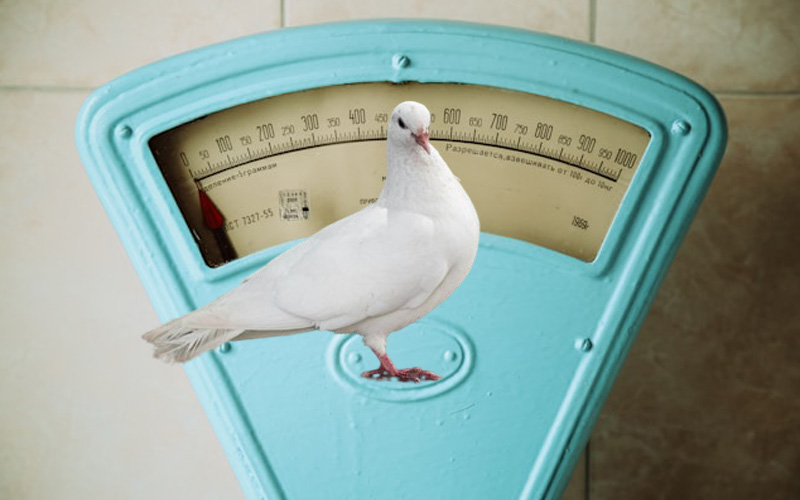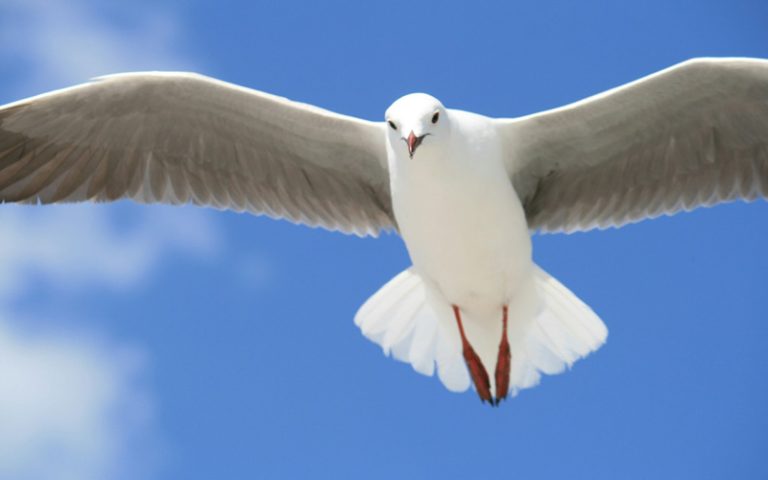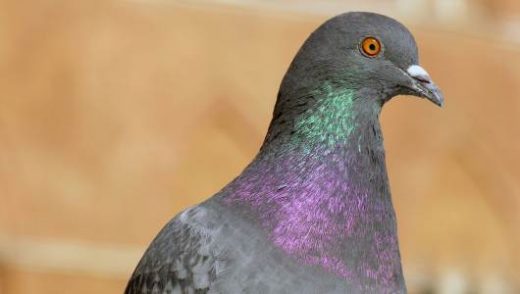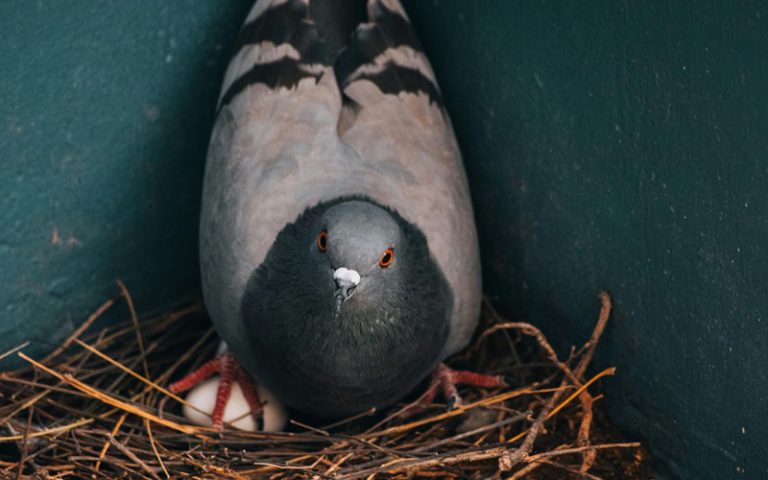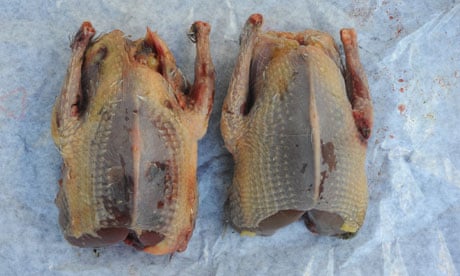How Much Does A Pigeon Weigh?
A pigeon typically weighs around 9 ounces or around 0.5 to 0.9 pounds, which is roughly half a pound. These birds are lightweight and agile, making them well-suited for flight. Their weight can vary slightly depending on factors such as age, species, and diet.
Do Male and Female Pigeons Weigh Differently?
A male pigeon typically weighs around 9 to 13 ounces (255 to 369 grams). However, the weight can vary slightly depending on the specific species of pigeon.
A female pigeon usually weighs slightly more than a male, with an average weight ranging from 12 to 14 ounces (340 to 397 grams). Again, the exact weight can vary among different pigeon species.
Male and female pigeons generally weigh differently. Males tend to be lighter than females. This is a common trait among many bird species where females are often larger and heavier due to the demands of reproduction.
So, if you spot pigeons and notice varying sizes, chances are you’re seeing a mix of males and females, with females typically being the larger ones.
Pigeon Weight Chart:
A chart by Pigeons ages:
| Age (weeks) | Average Weight (grams) |
|---|---|
| 1 | 50 |
| 2 | 100 |
| 3 | 150 |
| 4 | 200 |
| 5 | 250 |
| 6 | 300 |
| 7 | 350 |
| 8 | 400 |
A chart by Pigeons types:
| Pigeon Type | Average Weight (grams) | Average Weight (ounces) |
|---|---|---|
| Homing Pigeon | 400 – 600 | 14 – 21 |
| Racing Homer | 400 – 600 | 14 – 21 |
| Fancy Breeds | 300 – 500 | 10 – 18 |
| Utility Breeds | 500 – 800 | 18 – 28 |
| Exhibition Breeds | 400 – 700 | 14 – 25 |
| Fantail | 400 – 600 | 14 – 21 |
| Roller | 200 – 400 | 7 – 14 |
| King | 450 – 650 | 16 – 23 |
How Much Do Pigeons Weigh?
The weight of a pigeon can vary depending on the species. Here are some common types of pigeons along with their average weights:
- Rock Pigeon (Columba livia): The rock pigeon is one of the most widespread pigeon species and is commonly found in urban areas. It typically weighs around 9 to 13 ounces (255 to 369 grams).
- Homing Pigeon (Columba livia domestica): Homing pigeons are a domesticated variety of rock pigeons, and their weight is similar, ranging from 9 to 13 ounces (255 to 369 grams).
- Victoria Crowned Pigeon (Goura victoria): This large and striking pigeon species native to Papua New Guinea is known for its beautiful crest. It is considerably larger than the common pigeon, with an average weight of around 4 to 5 pounds (1.8 to 2.3 kilograms).
- Nicobar Pigeon (Caloenas nicobarica): Found in Southeast Asia and the Indian Nicobar Islands, the Nicobar pigeon is known for its vibrant plumage. It weighs approximately 1.5 to 2.5 pounds (680 to 1,134 grams).
- White King Pigeon: White King pigeons are a breed known for their large size and distinct appearance. They can weigh between 1.5 to 2.5 pounds (680 to 1,134 grams) or even more.
Factors Influencing Pigeon Weight
Understanding the weight of a pigeon isn’t as simple as throwing a bird on a scale. Various factors come into play, influencing these feathered friends’ weight in ways that might surprise you.
1. Breed Distinctions: Pigeon Variety Matters
Pigeons, much like dog breeds, come in a variety of shapes and sizes. Each breed carries its unique characteristics, including weight. For example, if you’re dealing with a Homing Pigeon, be prepared for a bird that’s a bit on the heavier side, tipping the scales at around 13 ounces. On the flip side, if you’re hanging out with an English Trumpeter, expect a lighter load, as they usually weigh in at a modest 9 ounces. So, before you start worrying about a pigeon’s weight, know your breed!
2. Age Matters: From Squabs to Seasoned Flyers
Just like us, pigeons go through different life stages that impact their weight. A young pigeon, known as a squab, won’t be breaking any weightlifting records. They start on the lower end of the weight spectrum, gradually gaining ounces as they mature into fully-fledged adults. Hence, if your pigeon appears to be on the lighter side, it could be a young buck that is still developing feathers.
3. Health and Diet: You Are What You Eat
Health is wealth, even in the pigeon world. A pigeon’s overall well-being and the contents of its diet directly influence its weight. A well-fed pigeon, munching on a balanced diet of grains and seeds, is more likely to strut within the standard weight range. On the other hand, a bird with a lackluster diet might find itself on the lighter end of the scale. Accordingly, if you want to keep your pigeons at an appropriate weight, pay attention to what goes into their beaks.
4. Seasonal Changes: Winter Fluff and Summer Slender
Pigeons, much like us during the holidays, can experience seasonal fluctuations in weight. During winter, they might sport a bit of extra fluff to stay warm, adding a few ounces to their usual weight. Come summer, when the living is easy, they might shed some of that winter weight for a more streamlined look. It’s a natural ebb and flow that keeps these birds adaptable to the changing seasons.
5. Environmental Factors: Stress, Temperature, and Beyond
Pigeons aren’t immune to the stresses of life. Environmental factors, such as changes in temperature, can impact their weight. Stress, whether from predators or disturbances in their surroundings, can also lead to weight fluctuations. Therefore, should you keep pigeons as pets, make sure they have a peaceful and comfortable environment to maintain a healthy weight.
How to Weigh a Pigeon?
When it comes to determining the weight of our feathered friends, employing the right methods is essential for accurate results. Here, we’ll know accessible and effective techniques used to weigh pigeons.
Digital Scales: The Swift Solution
One of the most straightforward and widely adopted methods for pigeon weighing involves digital scales. These modern devices provide quick and precise readings, making the entire process efficient.
Perch Weighing: Making it Comfortable
For a less invasive approach, perch weighing has become a favored technique among pigeon enthusiasts. This method involves training pigeons to perch on a designated weighing scale. This technique not only ensures accurate weight measurements but also minimizes any discomfort for the pigeons.
Hands-On Approach: Gentle and Caring
For those who prefer a more hands-on approach, manual weighing techniques can also be employed. This involves carefully cradling the pigeon and placing them on a calibrated scale. While this method requires a gentle touch and experience to avoid causing stress to the bird, it provides a personal connection between the caretaker and the pigeon.
Visual Estimation: A Quick Assessment
In situations where precision isn’t the primary concern, a visual estimation can offer a quick assessment of a pigeon’s weight. This method involves comparing the bird’s size and body condition to established standards, providing a rough idea of its weight. While not as accurate as digital scales or perch weighing, visual estimation can serve as a practical, on-the-go solution.
How Much Weight Can a Pigeon Carry?
Pigeons can carry a maximum of about 10% of their body weight. So, if a pigeon weighs around 300 grams, it can handle a payload of approximately 30 grams. These birds are surprisingly strong for their size, but they have limits to ensure they can fly effectively and cover long distances.
FAQ
During mating season, pigeons can shed pounds. The energetic courtship activities and increased stress levels cause them to burn more calories. Additionally, their focus on finding a mate may lead to decreased eating. This weight loss is a natural part of their reproductive behavior, ensuring they’re fit for the demands of courtship and parenting.
You should weigh your pet pigeon regularly, ideally once a week. Regular weighing helps you keep track of its health and ensures it’s maintaining a stable weight. This simple practice allows you to detect any sudden changes early on, promoting your pigeon’s well-being.
Pigeon weight varies among different breeds. Each pigeon breed has its own unique size and weight characteristics. Some breeds are smaller and lighter, while others are larger and heavier. So, the weight of pigeons is not consistent across breeds; it depends on the specific breed in question.
A pigeon’s weight can impact its ability to fly. If a pigeon is too heavy, it may struggle to stay airborne and maneuver effectively. A lighter weight allows easier takeoff and agile flight. Maintaining a healthy weight is crucial for pigeons to soar through the skies with ease and efficiency.

